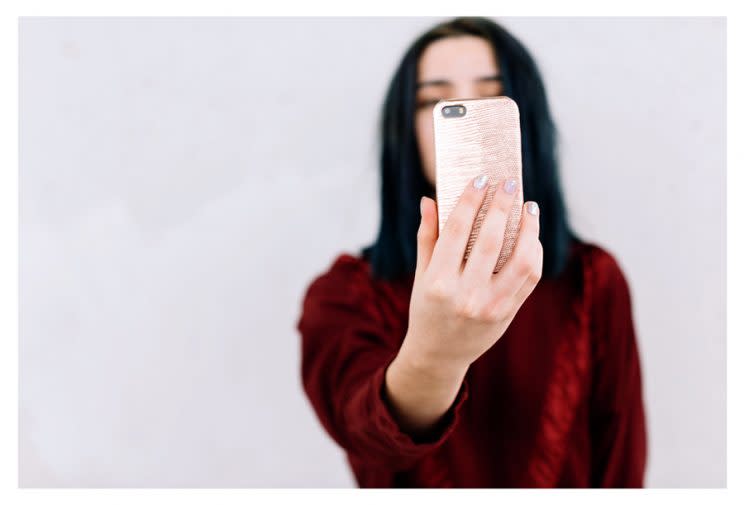Instagram Is Good for People With Insecurities and Depression, Says Study

Great news, Instagram addicts: The photo-sharing platform is good for you if you have insecurities or depression. According to new research from Drexel University, the social media site has become an outlet for people in pain looking for ways to overcome silence and express their feelings.
While many use Instagram to share #OOTDs or #GymSelfies, dig a little deeper and there’s a lot more to many people’s posts. Using pictures to explain the feelings and experiences that are often too painful or complicated to put into words, some users view Instagram as a safe medium for sharing sensitive information about themselves and reaching out for help.
Researchers Andrea Forte, an associate professor, and Nazanin Andalibi, a doctoral candidate in Drexel’s College of Computing & Informatics, examined the responses to a sample of 800 Instagram posts pulled from more than 95,000 photos tagged with “#depression” that were posted by 24,920 unique users over the course of a month. They found that not only are people using Instagram to make sensitive admissions, but also they are getting mostly positive support from the people who respond to the posts, and little in the way of negative or aggressive comments.
“Many of the data we analyzed were specifically about body image and appearance,” Forte tells Yahoo Beauty. “If we look at the top 100 tags that occurred together with #depression in our data set, we find terms like #fat #anorexia #beautiful #skinny #bulimic #ugly #thin #starving. When we analyzed the posts, we found that images about food and appearance attracted more responses than many other kinds of posts — both negative and positive comments.” Luckily they found that positive comments — for example, offering support — significantly outnumbered negative ones. “Overall, responses to posts about eating and body image were supportive of healthy behaviors, and few responses encouraged unhealthy behaviors,” Forte says.
“Emotional support and esteem support, which includes comments such as ‘You are strong and beautiful,’ were the most prevalent types of supportive comments,” Andalibi tells Yahoo Beauty. “In fact, posts about eating disorders or appearance concerns attracted significantly more comments with esteem support, likely boosting the self-esteem of the poster.”
Why do people with body image issues and insecurities take to Instagram? The study suggests that using hashtags and receiving positive support helps them to find a community or safe space. However, they didn’t find a lot of responses that offered assistance or proactive tips as to how to seek help. They concurred that Instagrammers who interact around depression-tagged posts may view the platform as a place for “legitimizing experiences rather than finding more pragmatic help.”
The Instagrammers they studied “might be trying to make sense of what is going on in their lives by sharing their personal narratives and story-telling — creating meaning through social sharing,” the paper states. The fact that many users post in-depth stories suggests that “those in distress or with stigmatized identities often need to express themselves and tell their stories, not only to potentially receive support or find similar others,” but simply to get it out.
However, those in-depth posts paid off — they received significantly more positive social support.
And these people aren’t always blatantly asking for support, but when they do, the researchers found that they often get it.
There have been past studies that advised people not to share emotional content on social media and even gave reasons to believe that Instagram is bad for self-esteem, but these findings contradict those points. “Some people have adopted Instagram as a place to do just that: to seek support, find similar others, and disclose stigmatized experiences. Importantly, in response they often receive positive support,” the paper states.
By why Instagram over Facebook or other social platforms? One factor could be the anonymity that Instagram allows. Facebook does not allow users to post under pseudonyms, but Instagram does, which makes it easier for people to open up and avoid being stigmatized.
But many public figures don’t need the anonymity to open up on Instagram. Ruby Rose has famously had #nofilter about her struggles with depression on the platform. Cara Delevingne has also written straight from the heart about her struggle with depression on social media.
Actress and vlogger Kenzie Brenna learned how to love her skin by following the Instagram hashtag #embracethesquish.
And Christie Brinkley’s daughter Sailor Brinkley Cook opened up on Instagram about her struggles with body image when promoting her spread in this year’s Sports Illustrated swimsuit issue on Instagram. “I’ve had issues with my body image since before I can even remember,” she revealed under a photo of her; her sister, Alexa Ray Joel; and their mom on the beach. “I grew up not loving how I looked and felt held back because of it. I don’t know why I always felt that way, sure I had baby fat and definitely went through a plethora of awkward phases, but I had a family that loved me i had friends who made me laugh etc. But for some reason I still looked in the mirror and always somehow found something to pick on. I went from being ‘too fat’ to ‘too thin’ to ‘too muscular’ and I never felt satisfied. My body and I have been through it all.”
So if you’re not happy with the way you look or feel, ’Gram away, if you’re so inclined; you might be surprised by the positive feedback you receive — even from strangers.
Let’s keep in touch! Follow Yahoo Style + Beauty on Facebook, Twitter, Instagram, and Pinterest.

